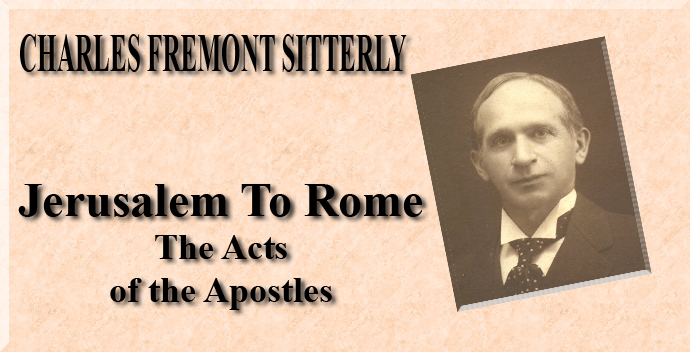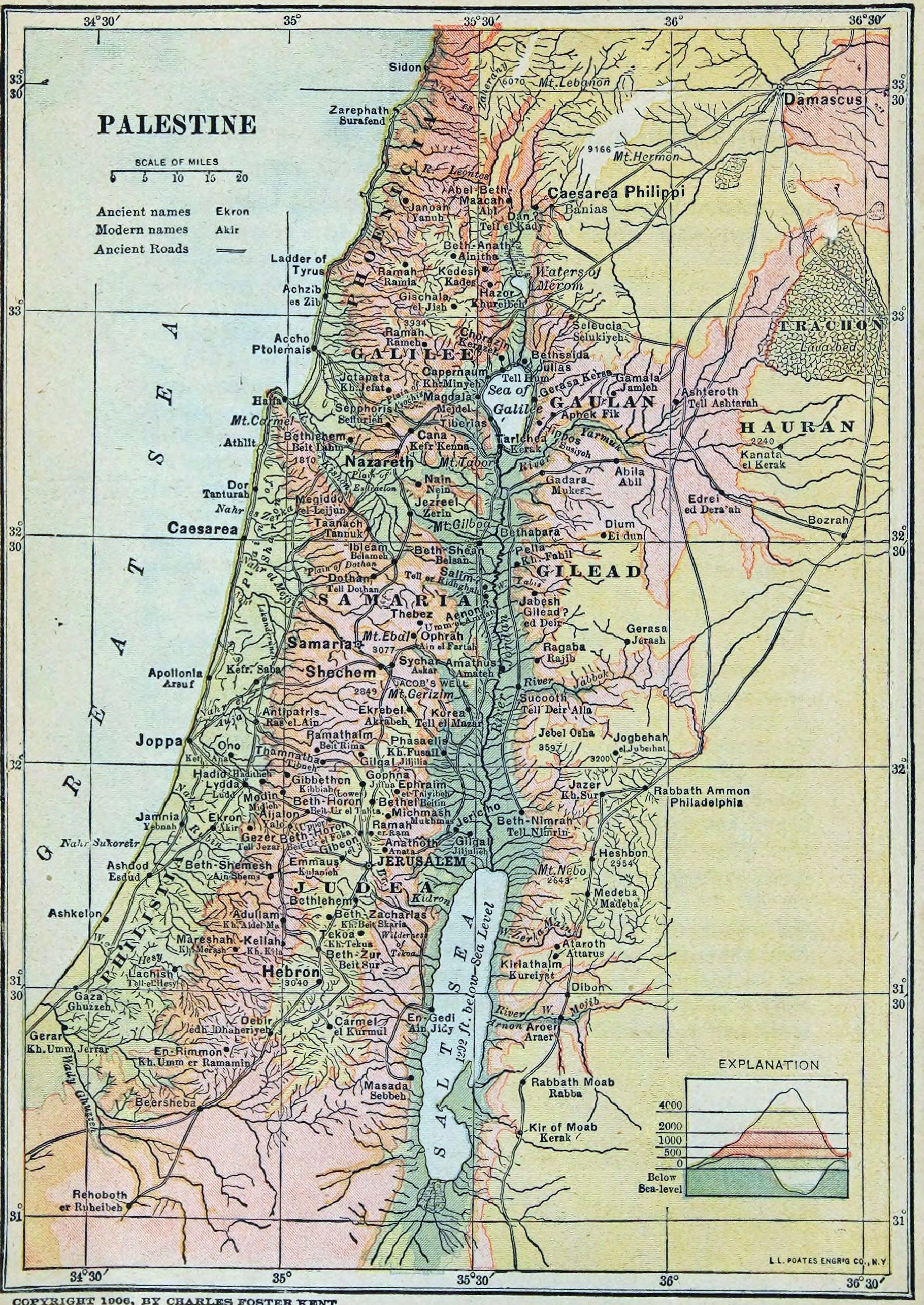|
‘Now Peter and John were going up to the Temple one day at three o’clock, the afternoon hour of prayer, just as a man lame from his birth was being carried along, whom they were wont to place daily at the Beautiful Gate, as it was called, of the Temple to ask alms from those entering the Temple. When he saw Peter and John about to go into the Temple he asked alms of them. Peter fixed his eyes upon him, as did also John, and said,
“Look at us.”
So he looked at them, expecting to receive something from them.
“Silver and gold,” Peter said, “I do not possess, but what I have I give you. In the name of Jesus Christ the Nazarene, rise up and walk.’ And he seized him by the right hand and raised him up. At once his feet and ankles grew strong and he leaped up, stood, began to walk about, and went with them into the Temple, walking about, leaping, and praising God. All the people saw him thus leaping, walking, and praising God. And when they came to recognize him as the man that used to be sitting to ask alms at the Beautiful Gate of the Temple they were struck with wonder and astonishment ‘at what had happened to him.
|
|
As Luke has already told us, the company of those being daily convinced by the testimony of the Twelve and their companions was very popular, especially in the Temple convocations, and he now proceeds to give a typical day of such doings. So wonderful a light had been shed by the Saviour’s teachings, death, and resurrection upon every phase of the temple ritual, that the Galilean nucleus of the new movement found unwonted delight in such services, and it would appear that they had given up any thought of return either to their old haunts or employments in the north. Peter and John seem to have become well-nigh inseparable. They are crossing the court between the Golden Gate in the eastern wall and the gate called “The Beautiful,” which led up to the Court of the Women, about three o’clock one afternoon, when a helpless beggar is being carried by kindly disposed relatives or neighbors away from his daily position on the steps leading up to the inner precincts, to his house for the night. Not to lose this last chance of an extra copper or so from the pious provincials, he hails them from his rude stretcher with a salutation of peace, at the same time extending his hand, in which is probably a begging bowl, for analms. The Apostles, moved with pity, stop and the neighbors let down their burden.
“Look here,” said Peter, “we have nothing to give, such as you expect, but something I am sure you will agree is far better. In the name of Jesus Christ the Nazarene, rise to your feet.” At the same time Peter grasped the cripple’s hand, and faith was kindled through the glance of mutual understanding and the lame man leaped to his feet with a bound. The careful statement as to “ankle bones” and “feet” and the tenses of the verbs and repetition of the actions involved are seen to reflect the interest of a close
observer, if not, indeed, the investigation of a medical inquirer. In any case, the verisimilitude of the record is most artless and convincing. That the man exercised saving faith is made clear by his joining Peter and John in the vesper service in the upper courts and by his outbursts of praise to God and evident reluctance to leave his new friends even for an instant. As he clings to Peter and John and keeps shouting the praises of God while descending ‘again to the Lower Court, hundreds of curious onlookers throng about them and soon recognize in the happy and well-nigh hilarious central figure their long-time cripple acquaintance, now running, now walking in perfect freedom and joy.
|
|
Thus while he was clinging to Peter and John all the people in amazement came running up toward them in what was called Solomon’s Portico. Peter, however, when he saw this addressed the people.
“Men of Israel,” he said, “why are you astonished at this man, or why are you staring at us, as if by our own power or piety we had made him walk? The God of Abraham and Isaac and Jacob, the God of our fathers, has honored His Servant Jesus, whom you handed over and repudiated before Pilate when he had determined to release Him. You, however, repudiated the Holy and Righteous One and asked as a favor for yourselves a man who was a murderer. And the Prince of Life you put to death, but God raised Him up from the dead, and we are His witnesses. It is His name, that is, the faith that has been placed in it, which has given strength to this man whom you are looking at and know. I say it is the faith He inspires which has made this man hale and strong again before you all.”
|
|
By the time they reach the long covered colonnade called by Herod Solomon’s Portico, running along the inner wall on the east front of the Temple, the Apostles decide to improve the occasion by preaching the gospel to the multitude, incidentally disclaiming any personal honors that now appeared sure to be attributed to them. As always, so here again, Peter seizes the opportunity plainly to charge upon the people of Jerusalem their fatal shortsightedness in not recognizing in Jesus the Nazarene their true and only Messiah, the fulfiller of every Old Testament prophecy, who, though submitting to temporary rejection and death at their hands, had shown Himself to be the very Prince of Life by rising from the grave and by renewing through power granted to His disciples the proofs of His eternal Kingship in miracles and cures. Such miracles and cures He had been wont to do in the days of His flesh in order to develop conviction and faith in His divine claims, and the instance of the healing of this cripple-born man was of like kind. Nothing short of divine power can account for such miracles, and all must acknowledge the infinite mercy of God and His Christ, both in granting such signal evidence and in restraining for a season the outpouring of righteous judgment upon so blind and unresponsive a nation. Under such circumstances there is but one course to pursue. They must repent; they must utterly reverse their mental attitude toward the claims and character of the Nazarene. If ignorance could be accepted as a possible cover for their actions in the past, such excuse will do no longer.
|
|
“And now, Brothers, I know that you did it through ignorance, just as your rulers did also, though it was in this way that God fulfilled what He had long ago foretold through all the Prophets, that is, the sufferings of His Christ. Repent therefore and change your whole attitude, so that your sins may be blotted out, and that seasons of refreshing may come from the presence of the
Lord, and that He may send Jesus, your long-heralded Christ, whom Heaven must receive until the times of the Restoration of all things. Of those times God spoke from the earliest ages through the mouth of his holy Prophets. Moses indeed said,
‘THE LORD YOUR GOD WILL RAISE YOU UP A PROPHET FROM AMONG YOUR BROTHERS AS HE HAS RAISED ME. Him you MUST HEAR IN EVERYTHING THAT HE says TO you. MoREOVER, EVERY SOUL THAT WILL NOT LISTEN TO THAT PROPHET WILL BE UTTERLY CUT OFF FROM AMONG THE PEOPLE’ (Deut. xviii, 15-19; Lev. xxiii, 29).
“Yes, and all the Prophets who have spoken from Samuel to the present time have predicted these very days. You are the Prophets’ sons and heirs of the covenant which God made with your fathers when He said to Abraham,
‘ALL THE FAMILIES OF THE EARTH SHALL BE BLESSED IN YOUR SEED’ (Gen. xii, 3; xxii, 18).
“To you first God, after raising up His Servant, has sent Him to bless you by turning every one of you from your wicked ways.”
|
|
Thus Peter leads up to a direct appeal, urging immediate and hearty acceptance of these facts and their logical implications. If their ecclesiastical rulers had urged that Jehovah’s Anointed should be revealed with all the pomp and glory of earthly greatness, they had only partially read or caught the meaning of the prophecies concerning Him. In point of fact, all the Prophets foretold the suffering and humiliation of the Messiah as marking the course of His earthly advent until His Ascension again to the right hand of eternal power. Having now fulfilled those prophecies to the letter, there remained on Israel’s part acceptance of these truths and full acknowledgment of her Messiah, so that the times of refreshment and restoration thereby assured might follow in their turn and His eternal and abiding manifestation might be made, not in an earthly and temporal form, as they and their teachers wrongly taught, but in a spiritual rule and kingdom, such as was already being set up in their very midst. Warming to his subject, and inspired with spiritual insight such as was never equaled by any Christian teacher of whom we have record, unless it be Paul, this man, Simon Peter, again amazes us by his versatile range and facile accuracy in the use and interpretation of the Old Testament. What Luke in his Gospel says the Saviour did on the road to Emmaus, when, “Beginning with Moses and all the prophets, He expounded to them in all the Scriptures the things concerning Himself,” and again in the upper room He referred “to all the things which are written concerning Me in the Law of Moses and in the Prophets and Psalms,” ... “That the Christ should suffer and should rise from the dead the third day, and that repentance unto remission of sins should be preached in His name”—all this we now see must have been the chief work of the Master during His forty days of fellowship with His disciples, so that He might open their minds, that they might understand the real message of the Scriptures. In Peter’s alert and gifted mind, saturated, as it must have been, with the Old Testament letter, quickened during more
than three years by constant and close companionship with the Teacher of the ages, we have a perfect reaction, and when we illumine it with the gift of the Holy Spirit we have an equipment for eloquent and convincing propaganda suited to the highest work entrusted to men.
|



 Home
Home What's New
What's New Bible
Bible Photos
Photos Hiking
Hiking E-Books
E-Books Genealogy
Genealogy Profile
Free Plug-ins You May Need
Profile
Free Plug-ins You May Need
 Get Java
Get Java.png) Get Flash
Get Flash Get 7-Zip
Get 7-Zip Get Acrobat Reader
Get Acrobat Reader Get TheWORD
Get TheWORD
